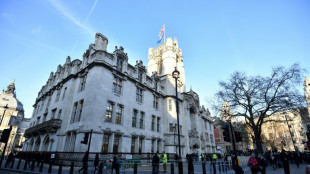
-
 Cambodia's Chinese casino city bets big on Beijing
Cambodia's Chinese casino city bets big on Beijing
-
Vespa love affair: Indonesians turn vintage scooters electric

-
 Europe seeks to break its US tech addiction
Europe seeks to break its US tech addiction
-
Long-abandoned Welsh mine revived as gold prices soar

-
 UK's top court to rule on how to define a 'woman'
UK's top court to rule on how to define a 'woman'
-
WHO countries reach landmark agreement on tackling future pandemics

-
 Stocks struggle again as Nvidia chip curb warning pops calm
Stocks struggle again as Nvidia chip curb warning pops calm
-
China's economy beats forecasts ahead of Trump's 'Liberation Day'

-
 China's economy beat forecasts in first quarter ahead of Trump's 'Liberation Day'
China's economy beat forecasts in first quarter ahead of Trump's 'Liberation Day'
-
Trump orders critical minerals probe that may bring new tariffs

-
 Onana faces date with destiny as Man Utd chase Lyon win
Onana faces date with destiny as Man Utd chase Lyon win
-
Lessons in horror with Cambodia's Khmer Rouge tribunal

-
 Pandemic agreement: key points
Pandemic agreement: key points
-
Paramilitaries declare rival government as Sudan war hits two-year mark

-
 Landmark agreement reached at WHO over tackling future pandemics
Landmark agreement reached at WHO over tackling future pandemics
-
'La bolita,' Cuban lottery offering hope in tough times

-
 'Toxic beauty': Rise of 'looksmaxxing' influencers
'Toxic beauty': Rise of 'looksmaxxing' influencers
-
Facebook added 'value' to Instagram, Zuckerberg tells antitrust trial

-
 Trump signs order aimed at lowering drug prices
Trump signs order aimed at lowering drug prices
-
Paramilitaries declare rival government as Sudan war enters third year

-
 Nvidia expects $5.5 bn hit as US targets chips sent to China
Nvidia expects $5.5 bn hit as US targets chips sent to China
-
Emery targets 'next step' for Aston Villa after Champions League heroics

-
 'Gap too big' for Dortmund after first leg, says Guirassy
'Gap too big' for Dortmund after first leg, says Guirassy
-
Maradona's daughter says doctors could have prevented his death

-
 Barcelona 'justified' semi-final spot despite Dortmund loss, says Flick
Barcelona 'justified' semi-final spot despite Dortmund loss, says Flick
-
'We thought the tie was over': Dembele admits PSG switched off against Villa

-
 Wine consumption falls heavily into the red
Wine consumption falls heavily into the red
-
Barca through to Champions League semis despite Guirassy hat-trick

-
 Global stocks mixed amid lingering unease over trade war
Global stocks mixed amid lingering unease over trade war
-
PSG survive Aston Villa scare to reach Champions League semis

-
 Pandemic treaty talks fight late hurdles
Pandemic treaty talks fight late hurdles
-
Trump resurrects ghost of US military bases in Panama

-
 Family seeks homicide charges against owners of collapsed Dominican nightclub
Family seeks homicide charges against owners of collapsed Dominican nightclub
-
Sudan paramilitary chief declares rival government two years into war

-
 Boeing faces fresh crisis with US-China trade war
Boeing faces fresh crisis with US-China trade war
-
Trump eyes slashing State Department by 50 percent: US media

-
 Canada offers automakers tariff relief, Honda denies weighing move
Canada offers automakers tariff relief, Honda denies weighing move
-
Facebook added 'value' to Instagram, Zuckerberg says in antitrust trial

-
 French Ligue 1 clubs vote to break TV deal with DAZN
French Ligue 1 clubs vote to break TV deal with DAZN
-
Peru court sentences ex-president Humala to 15 years for graft

-
 Sumy buries mother and daughter victims of Russian double strike
Sumy buries mother and daughter victims of Russian double strike
-
Trump says ball in China's court on tariffs

-
 Kane urges Bayern to hit the mark against Inter in Champions League
Kane urges Bayern to hit the mark against Inter in Champions League
-
Trump ramps up conflict against defiant Harvard

-
 Arteta feeding Arsenal stars 'opposite' of comeback message
Arteta feeding Arsenal stars 'opposite' of comeback message
-
France's Macron honours craftspeople who rebuilt Notre Dame

-
 Watkins left on Villa bench for PSG return
Watkins left on Villa bench for PSG return
-
Chahal stars as Punjab defend IPL's lowest total of 111 in 'best win'

-
 French swim star Marchand considered taking year-long break
French swim star Marchand considered taking year-long break
-
Chahal stars as Punjab defend IPL's lowest total of 111


Hungarian lawmakers back constitutional curbs on LGBTQ people, dual nationals
Hungarian lawmakers on Monday overwhelmingly backed constitutional changes targeting the country's LGBTQ community and dual nationals, the latest step to strengthen longtime nationalist Prime Minister Viktor Orban's self-styled "illiberal" brand of democracy.
Since his return to power in 2010, Hungary's leader has widely restricted the rights of the LGBTQ community, the media, courts and academia. In mid-March, he vowed to undertake an "Easter cleanup" against his domestic opponents he has called "stink bugs".
The constitutional amendment -- which proclaims that people can only be male or female -- echoes moves on gender by Orban's ally US President Donald Trump.
It also allows the "temporary" stripping of citizenship from some dual or multiple nationals, which could target Hungarian-American billionaire George Soros, a regular fixture of populist conspiracy theories.
Ahead of the vote on the amendment -- which passed parliament with 140 votes in favour to 21 against -- a few dozen protesters temporarily blocked an entrance to parliament before police hauled them off.
"When we chained ourselves up during the constitution's first overhaul in 2011, we never thought that 14 years later, we would have to do the same thing," said opposition lawmaker Timea Szabo.
Opposition politicians from the liberal Momentum unfurled a banner to protest the vote in parliament, while hundreds of protesters outside the building chanted "We will not allow ourselves to be transformed into Putin's Russia".
Ruby, a 19-year-old transgender woman, who declined to give her surname, told AFP that she joined the rally to stand up against the government which seeks "to eliminate transgender people" and "hide what they don't like, just as in Russia".
- Raft of changes -
Besides the provision proclaiming that people can only be male or female, another declares that children's rights for their "proper physical, mental and moral development take precedence over all other fundamental rights", except the right to life.
That provision is seen as a way to strengthen the legal foundations for the prohibition of the Pride march.
Another prominent provision empowers the government to temporarily strip Hungarian citizenship from dual or multiple nationals -- even if they acquired their nationalities by birth.
The governing party suggested the move is aimed at "speculators" financing "bogus NGOs, bought politicians and the so-called independent media" from abroad.
A related piece of legislation -- to be voted on at a later date -- specifies that Hungarian citizenship can be suspended for a maximum of 10 years and those affected can be expelled from the country.
Nationals from other EU member states would be exempt, together with a few other countries in Europe, according to the proposal.
Last week, more than 30 prominent Hungarian legal experts castigated the measure as "an unprecedented construction in international law" that could be contrary to binding human rights conventions.
- 'Soft Putinism' -
Critics say the proposed legal changes further erode democratic rights in the central European country, moving the EU member state even closer to the kind of authoritarianism seen under Russia's President Vladimir Putin.
"You could consider this soft Putinism," Szabolcs Pek, chief analyst at the think tank Iranytu Intezet, told AFP.
"People are not falling out of the window, but the government is increasingly limiting the space for opposition politicians, journalists and civil society," he said.
Politically, the measures are seen as an effort to shore up dwindling support for the ruling coalition, divide the opposition along ideological lines, and court the far right ahead of next spring's parliamentary election.
Orban's legislative "boisterousness" is a bid to take back control of the public agenda, according to Pek.
"In this respect, he has been successful, because public discourse is no longer about the failing public services or the weak economy," Pek said.
Since last year, Orban has faced an unprecedented challenge from former government insider-turned-opposition leader Peter Magyar, whose TISZA party has been eroding Fidesz's longtime solid lead, according to opinion polls.
Pek stressed the Pride ban is a "trap" for Magyar: standing up for LGBTQ rights could lose him conservative supporters, but his current silence might drive left-wing and liberal voters to other opposition parties.
A.Zbinden--VB
